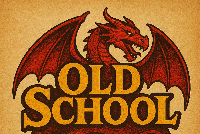James J. said: "Where you're not seeing the difference between "old school" simulationist play and story now/collaborative improv" Patronizing. I'd submit, based on this and other threads, you're simply predisposed to hearing my tone as patronizing because you don't agree with my positions. How many "No Myth" potshots have you taken at me of late even in threads not discussing it? In the above sentence, I'm literally saying he's not "seeing" it because the flowchart specifically denotes a difference between the approaches such that the PCs are the "main characters" (i.e. protagonists) - see the lower right part of the flowchart. "My game world... goes on with or without the PCs" (see just to left of what I just pointed out) is a hallmark of the "old school/sandbox" approach, indicating rather clearly that the PCs aren't the "main characters." I further clarified the differences in a link provided in response to Lewis W.'s post. Do you have issues with retaining players in your groups? Yes. In fact many people here do. Does is say anything about me? No, but you do, when you are not busying yourself in instructing the locals on how to play better. I haven't said anything about you personally. I don't know you at all, only what you post. I think it's important and valuable to examine why people are having issues retaining players in their groups. Isn't it better to examine it honestly and figure out ways to make more stable productive gaming groups? If you don't want to engage in that discussion, nobody's forcing you. Have you had
groups disband because people stopped showing up? Yes, in fact many people here have. I know, it's been going on for 30+ years. Long before Roll20 came around. I put forth that it's because many people aren't communicating with each other about what they want from the game and how they will get there together. Do your groups of 8
become groups of 2, say, recently ? Absolutely. Maybe you can poll them privately to find out why. Maybe you could do that for every game here that's failed. Lots of work. Don't you think it's your responsibility to do that with your own players? I don't have issues retaining players as GM because I find players that buy-in to the approach we're using and content we're exploring. I would love it if the community could have the same benefit (how many "flaky players" or "bad GM" threads do we get in a week?) and that groups I myself join as a player didn't have player retention issues. I'm not here to tell people how to play, or tell them how much better my style is. That's where we differ. I'm not telling people how to play or how much better my style is. I'm telling them how I play and how I don't play and what kind of game experience that produces. Sometimes I ask about the way they play and we debate the finer points of each so as to better understand each other's position. Sometimes people take it personally when there is no need for that and no ill intent on my part. Play how you want. When you don't get the results you want or lose players as a result of how you play, maybe it's because you haven't effectively communicated your creative agenda and gotten player buy-in on that notion. That is what this thread is about - communication so as to form better, more stable groups - which is ironically being obfuscated by objections to tone. To all: How do you communicate your style and creative agenda to players before you start a campaign?






















